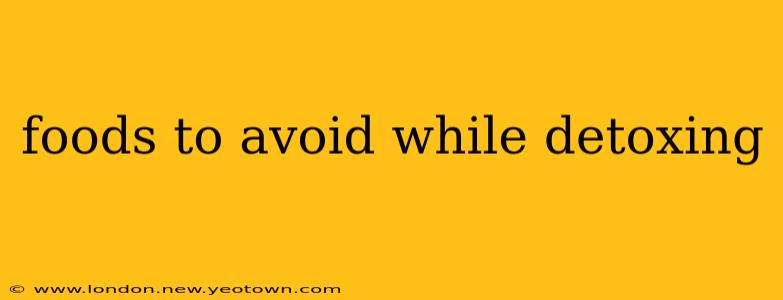Foods to Avoid While Detoxing: A Journey to a Healthier You
Detoxing. The word itself conjures images of vibrant smoothies, leafy greens, and a renewed sense of vitality. But what about the foods you should avoid during this journey to a healthier you? It's not just about what you add; it's equally crucial to understand what you need to subtract from your diet for optimal results. This isn't about extreme cleanses, but rather a mindful approach to supporting your body's natural detoxification processes.
Let's embark on this exploration together, uncovering the culinary culprits that can hinder your detox efforts. We'll also tackle some frequently asked questions to clear up any lingering doubts.
1. Processed Foods: The Detox Saboteurs
Imagine this: your body, a finely tuned machine, suddenly overwhelmed by a deluge of artificial ingredients, preservatives, and excessive sodium. Processed foods—think packaged snacks, fast food, and pre-made meals—are the main offenders. These foods often contain trans fats, high fructose corn syrup, and excessive amounts of sodium, all of which place an unnecessary burden on your liver and kidneys, the primary organs responsible for detoxification. Avoiding these processed foods allows your body to focus its energy on naturally cleansing itself.
2. Refined Sugars: A Sweet Deception
That seemingly innocent sugary treat? It might be undermining your detox efforts. Refined sugars, found in sugary drinks, pastries, and many processed foods, trigger inflammation and place stress on your liver. They also contribute to nutrient deficiencies, preventing your body from obtaining the essential vitamins and minerals it needs to effectively detoxify. Choosing whole, unrefined sugars like those in fruits is a much better alternative.
3. Alcohol: A Detox Roadblock
Alcohol, while enjoyable in moderation for some, puts significant strain on your liver, slowing down the detoxification process. The liver prioritizes processing alcohol, thus delaying its ability to handle other toxins. While a complete abstinence isn't always necessary, significantly reducing or eliminating alcohol during your detox period can make a noticeable difference.
4. Caffeine: A Stimulant's Shadow
While a morning cup of coffee might seem harmless, caffeine can be dehydrating and can potentially interfere with detoxification. It stimulates the adrenal glands, which can impact the body's ability to rest and repair itself, a crucial aspect of any effective detox. Try reducing your caffeine intake or opting for caffeine-free alternatives like herbal teas.
5. Gluten and Dairy: Potential Irritants
For some individuals, gluten and dairy can trigger inflammation in the gut. Since gut health plays a critical role in overall well-being, including detoxification, avoiding these foods (or at least reducing consumption) can ease digestive distress and support overall detoxification. Listen to your body—if you experience discomfort after consuming these foods, consider reducing or eliminating them during your detox.
What are some common detox myths?
Many people believe extreme detox diets and cleanses are necessary. The truth is your body naturally detoxifies itself. A healthy diet, exercise, and adequate water intake are all that is truly needed. Focus on supporting your body's natural processes instead of relying on extreme measures.
Are detox teas effective?
Detox teas often contain herbs and ingredients that can promote bowel movements, but their effectiveness in removing toxins from your body is unproven. While they might provide temporary relief from bloating, they are not a substitute for a healthy diet and lifestyle.
How long should I detox for?
There's no one-size-fits-all answer. Instead of focusing on a specific timeframe, concentrate on making lasting changes to your diet and lifestyle. A sustained, gradual shift towards healthier choices will be more beneficial in the long run.
Embarking on a detox journey isn't about drastic measures; it's about mindful choices that support your body's natural cleansing capabilities. By focusing on whole, unprocessed foods and reducing or eliminating the foods mentioned above, you can pave the way for a healthier, more vibrant you. Remember, consistency is key! A sustainable approach yields far greater results than any quick fix.

